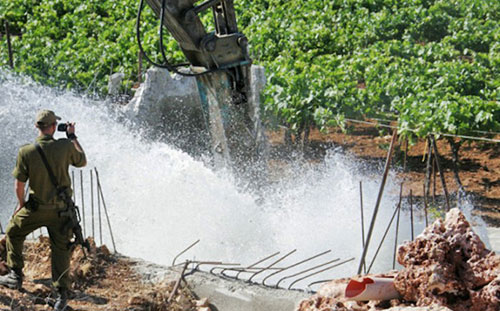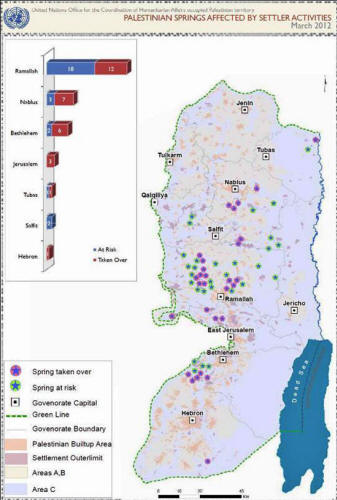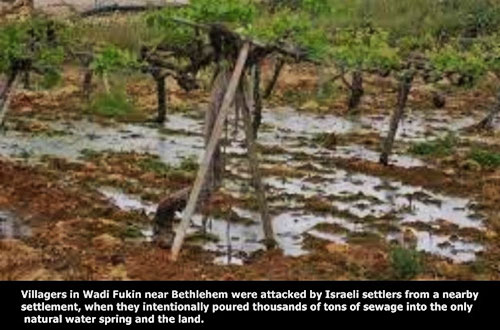|
from Intifada-Palestine Website
Water is a necessity to all forms of life.
Access to clean water is an essential precondition for the viability of any community.
Sanitation, especially wastewater treatment, is also essential for public health, for protection of the environment, and for water reservation. International laws and universally accepted sanitation standards have been set up to protect the right to access clean water and to protect environment and water conservation.
In occupied Palestine the Israeli government is violating all these rights, and had turned water into weapon of slow graduated genocide.
Many Palestinian cities in the West Bank and especially in the Gaza Strip face chronic clean water shortages. The rural communities are virtually deprived of water and depend mainly on very expensive tank-water supplies. In the main cities Palestinians have access to an average of only 70 liters of water per person per day for domestic use and personal hygiene, much less than the World Health Organization (WHO) recommended minimum of 100 liters.
In the rural areas Palestinians are surviving on 20-30 liters of water per person per day, while adjacent illegal Israeli colonies (settlements) built on stolen Palestinian land enjoy unlimited constant supply of water for personal as well as recreational (swimming pools, parks and gardens) use.
It was estimated that 44% of Palestinian children in the rural areas suffer from diarrhea - the biggest killer of children under 5 years old in the world- because of poor water quality and hygiene standards.
According to the UNHRC Israeli,
Aware of the dire water situation in the occupied West Bank and Gaza Strip, donor countries had supported Palestinian Authority's efforts to develop the water and sanitation sector, and had specified funds for the construction of water reservoirs, wastewater treatment facilities, and the repair and expansion of water and sewage networks.
Emergency Water Sanitation and Hygiene Group (EWASH), a coalition of 30 leading humanitarian agencies, have been working with Palestinian local authorities to identify and to respond to water, sanitation and hygienic needs to Palestinian communities.
Under international humanitarian laws water resources and projects, including water sanitation and hygiene (WASH) infrastructures are considered civilian facilities essential for the survival of the population, and thus are protected from destruction under any circumstance.
Yet the Israeli government, with its long record of violating many international laws, with the cooperation of its national water company Mekorot and the Israeli agri-industrial firm Mehadrin had adopted systematic, grave, malicious and discriminatory policies to hinder Palestinian access to water in the West Bank and Gaza Strip, combined with massive theft of water resources.
A report by the United Nations Human Rights Council states that the two Israeli Mekorot and Mehadrin companies severely undermine Palestinians' access to water, especially in occupied Jordan Valley, siphoning Palestinian wells and springs water to the illegal Israeli colonies (settlements) in the West Bank.
Palestinian water is stolen and piped into Israel at no cost. A fraction of it is then piped back and sold to Palestinian cities. In this way Israel is stealing from Palestinians both their water and their money.
In Oslo II agreement a Palestinian Israeli Joint Water Committee (JWC) was established to manage water resources and wastewater treatment facilities.
The Israeli government exercises a veto-like power within JWC and through slow bureaucracy blocks most licenses and permits for new water facilities in the West Bank, conditioning them on Palestinian reciprocal approval of projects in the illegal colonies (settlements); an arrangement the Palestinian Authority rejects for fear of legitimizing these colonies.
The ability of the Palestinian Authority to develop its WASH sector to meet its national priorities has been severely limited by Israeli policies.
Palestinians have not been able to build the needed large scale water service infrastructures to secure water and sanitation services to its population. Between 1995 and 2011 the Palestinian Authority submitted 30 projects for wastewater treatment plant projects to the JWC for approval.
Only four of these, related to minor repair, were accepted. Again in 2011 the Palestinian Authority submitted 38 projects to rehabilitate agricultural water wells but the JWC approved only three of them.
Due to the Israeli imposed artificial water shortages and lack of wastewater treatment facilities and sewage networks the majority of Palestinians resorted to the old practice of constructing privately owned water wells, cesspits and septic tanks. In the rural areas Palestinians depend on rain water gathering pools, cisterns and water tanks.
This increases the risks of public health and damage to the environment.
Besides the Israeli protracted bureaucracy and the open theft of Palestinian water, the Israeli government had adopted and implemented unethical and illegal policies and practices to destroy Palestinian water resources and to contaminate their farmland to actuate Palestinian self- evacuation of a coveted area and the spread of deadly disease among their vulnerable children.
The terrorist Israeli army routinely carries what is called demolition orders of alleged unlicensed communal water cisterns and water wells in privately owned farmland.
Many of these cisterns and wells are hundreds of years old; older than the illegal state of Israel itself.
The demolition orders also include WASH structures and water tanks supplied to Palestinian rural areas, and animal and tractor driven water tanks. In 2011 alone Israeli army had demolished 89 WASH structures in the West Bank including 21 wells, 34 cisterns and many small fixed water tanks given to the rural households especially those in the Jordan Valley.
Such demolition also included the razing of vegetable gardens and the destruction of animal barns and storage sheds.
This destruction violates Article 53 of the Fourth Geneva Convention, which prohibits the destruction of private or public property, and it is a clear violation of the right to water, a component of the right to an adequate standard of living, protected by Article 11 of the International covenant of Economic, Social and Cultural Rights.
The Israeli government uses such denial of water to trigger people displacement, particularly in areas slated for colonial expansion, especially since these communities are mostly farmers, who depend on water for their livelihoods. Cutting off Palestinian communities from their water resources usually precedes dispossession of land for new colonial projects.
The 700 kilometer Israeli-built separation/apartheid wall, been under construction since 2002, has been deliberately snaked through the West Bank to include, on the Israeli side, the rich fertile Palestinian agricultural land with large groundwater aquifers, especially within Jenin, Qalqilya, and Tulkarem provinces.
The wall has further reduced Palestinian access to water and has resulted into the loss of access to 49 water wells and reservoirs used for drinking and agricultural purposes.
In the besieged Gaza Strip water resources and water treatment facilities seem to be one of the main targets of the Israeli air raids and land incursions. Sewage pumping stations, wastewater treatment facilities, main city water reservoirs and agricultural cisterns, many of them predate the illegal establishment of Israeli state, sustained direct bombing by Israeli war planes.
Since 2005 Israeli military incursions had intentionally destroyed at least 300 agricultural wells located in the Israeli designated buffer zone.
Scores of wells, rainwater harvesting cisterns, roof water tanks, and many miles of water main pipes and other farm irrigation networks have been deliberately targeted and destroyed by Israeli forces during their military operations.
During the 2008/09 Israeli "Cast Lead" offensive against Gaza, the Israeli air raids, artilleries and military tanks targeted Gaza's vital water resources; pumping stations, wastewater treatment facilities and sewage treatment plants causing damages worth $6 million.
The situation in Gaza is especially dire.
Palestinians rely entirely on the already depleted, saltwater-contaminated and sewage-polluted aquifer, whose water is unfit for human consumption. The illegal inhumane Israeli imposed siege restricts the import of many essential goods including the fuel necessary to run Gaza's single power station.
Without electricity wastewater treatment facilities and running water pumps cannot operate, resulting sewage pollution. It is estimated that 89 million liters of sewage flow daily into the Mediterranean Sea raising the level of nitrates in water, up to six times above the WHO limits of 50 mg/l.
This also contaminates the fish many Palestinians in Gaza depend on as the main food items.
Up to 95% of the water extracted from the Gaza coastal aquifer is unsuitable for human consumption due to over exploitation and wastewater contamination. Many families depend on tinkered water. Sadly this water, too, has been found to be severely contaminated by bacteria.
According to UNRWA diarrhea and viral hepatitis are the major causes of morbidity in the refugee population of the Gaza Strip.
The worst damage to Palestinian water resources, to their farmland, and to the environment is caused by the armed to the teeth religiously extremists occupiers (settlers).
Driven by their supremacist racist religion, and unhindered, but tacitly encouraged and protected, by the Israeli government and army, these Israeli fanatics illegally and forcefully occupy hill tops of Palestinian farm land, build their illegal colonies, and start attacking the neighboring Palestinian communities.
Besides attacking Palestinian homes, torching their crops and animal barns, they confiscate water springs, poison Palestinian water wells with chemicals, spoil them with dirty diapers, with their own feces or with dead chickens, and topple and shoot roof top water tanks.
Those fanatic colonizers are the largest per capita producers of wastewater in the West Bank, discharging large quantities of sewage directly into the environment, contaminating adjacent agricultural land and water streams.
Randomly building their colonies on the hill tops without sewage and wastewater treatment facilities those extremist colonizers dump their wastewater and sewage down the hill towards Palestinian communities and farmland causing severe ecological damage and contamination to Palestinian agricultural food products thus spreading diseases.
As reported by the UN in March 2012, one other major threat to Palestinians arises from settlers seizing springs by force. The report states:
The UN Office for the Coordination of Humanitarian Affairs (OCHA) examined 50 springs on Palestinian land close to Israeli settlements and found that:
Israel is deliberately and arrogantly violating many international laws it is a state party of, notably,
Israel's violation of all these international laws accompanied with its unethical policies and practices to deprive the whole Palestinian population of their access rights to the necessary clean water is considered a genocidal crime, a crime Israel (Jews) is very famous of.
|



